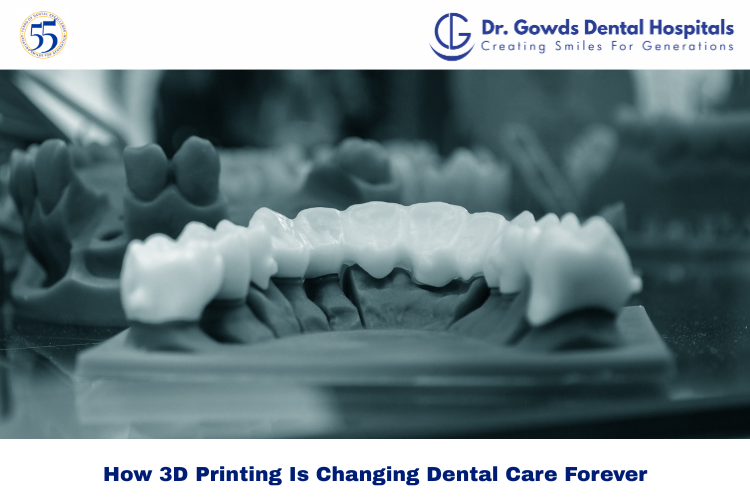Schedule Appointment



3D printing is revolutionizing contemporary dentistry by allowing dentists to create crowns, dentures, and other prosthetics faster, more accurately, and at lower costs. Using digital scans and biocompatible materials, this technology ensures custom-fit, high-quality restorations—often delivered in just one visit. This innovation is being welcomed at Dr. Gowds Dental Hospital in order to provide patients with fast, accurate, and top-notch dental replacements. It is accurate, efficient, and patient-friendly.
Imagine getting a new tooth in just one day. No messy impressions, no long wait times, no temporary fixes.
3D printing is revolutionizing the way dentists rebuild smiles because it makes the procedure faster, more precise, and more comfortable for patients.
3D printing involves using advanced digital imaging and additive manufacturing to create custom-fit dental prosthetics. Whether you need a crown, bridge, denture, or implant guide, 3D printing allows dental professionals to deliver high-quality, personalized restorations with minimal delays.
Dentists begin by scanning your teeth using an intraoral scanner. This data is turned into a digital 3D model, which is then used to print your prosthetic with extreme precision using biocompatible materials. The result? A replacement is ready in a fraction of the seconds, that fits flawlessly, with a natural look.
The 3D printing means that dental professionals can design and fabricate multiple types of restorations quickly and efficiently with accurate placement. This streamlines reducing the margin of error and enhancing the overall patient experience.
1. Lightning-Fast Turnaround Times:
Old traditional dental processor can take weeks to produce a crown or denture with multiple sittings. With 3D printing, many replacements are ready within a few hours to a couple of days.
2. Precision Fit & Customised Solution:
Avoiding fewer errors. Your new tooth or prosthetic is designed exactly to your oral anatomy, which improves comfort. By eliminating the guesswork, 3D-printed prosthetics deliver consistent, reliable results without errors.
3. Better Patient Experience
No gooey impressions. No multiple visits. The process is faster, cleaner, and less stressful for the patient. Patients appreciate the modern, tech-forward approach, and dentists appreciate fewer remakes and adjustments.
4. Affordable and Efficient
With simple steps, 3D printed dental replacements can be more affordable in the long term. While patients enjoy reduced chair time and multiple appointments.
5. Pain-Friendly Dentistry
The 3D printer reduces material waste and eliminates the need of physical molds making it a greener option. This supports sustainable practices in dental clinics.
3D printing technology is already being used to create:
Crowns and Bridges: Durable and aesthetic, printed in a fraction of the time.
Full and Partial Dentures: Sturdy, lightweight, and well-fitting.
Implant Surgical Guides: Ensuring that dental implants are placed precisely.
Orthodontic Aligners and Retainers: Custom-made devices for straightening and retention.
Temporary Teeth and Mock-Ups: Preview your smile before the final placement.
Night Guards and Splints: Tailored protection for bruxism and TMJ disorders.
Each of these elements can be customized to guarantee that patients receive care that is specific to their needs, enhancing both appearance and functionality.
Here’s how a typical 3D printing dental workflow goes:
Digital Scanning: A small intraoral camera scans your mouth, creating an accurate 3D digital impression.
Design & Planning: Your restoration will be designed by dental professionals using CAD (Computer-Aided Design) software.
3D Printing: A 3D printer receives the design and builds the restoration layer by layer using materials like metal, ceramic, or dental resin.
Fitting & Adjustment: Once printed, the item is finished, polished, and adjusted as needed before placement.
Patient outcomes and satisfaction are greatly enhanced by this high-tech, effective workflow.
3D printing is ideal for a wide range of patients:
The adaptability of this technology means it’s not just for high-end clinics anymore. To help more people achieve better results, many dental offices, including Dr. Gowds Dental Hospital is investing in these tools.
Despite being an effective tool, 3D printing is not a universally applicable solution. Some difficult dental cases may need traditional lab work, especially where special materials or methods are needed. By combining digital and manual methods, hybrid workflows allow dentists to choose the best way for each patient.
Dental technology is developing with the latest technologies like 3D printing is taking the charge. With its speed, precision, and customization, it offers dentists with a more adaptable and patient-focused approach. At Dr. Gowds Dental Hospital, we combine innovation with experience to offer superior dental replacements for all ages.
3D printing is here to stay. It’s an effective, time optimized process and perfectly aligned with the needs of modern dentistry. If you’re considering a dental restoration, ask your dentist about this creative option and discover how a better smile might be just one print away.
1. Is 3D printed dental prosthetics as strong as traditional ones?
Yes. Modern 3D printing uses high-quality, biocompatible materials that provide strong and longevity comparable to traditional methods
.
2. Can I get a same-day crown or denture with 3D printing?
In many clinics equipped with in-house 3D printers, yes. The complexity of the treatment will give the final timeline.
3. How much will 3D printed dental replacements cost?
Costs may vary by procedure and dental clinic, but 3D printing technology often reduces the need for multiple appointments, which can reduce overall treatment time.
4. Is 3D printing technology safe to predict dental solutions?
Absolutely. Materials used in 3D printers for dental technology are approved by the FDA.
5. Can 3D printers also be used for child dental care?
Yes. It is useful for orthodontic solutions, space detection in between the teeth, and pediatric crowns where customization.